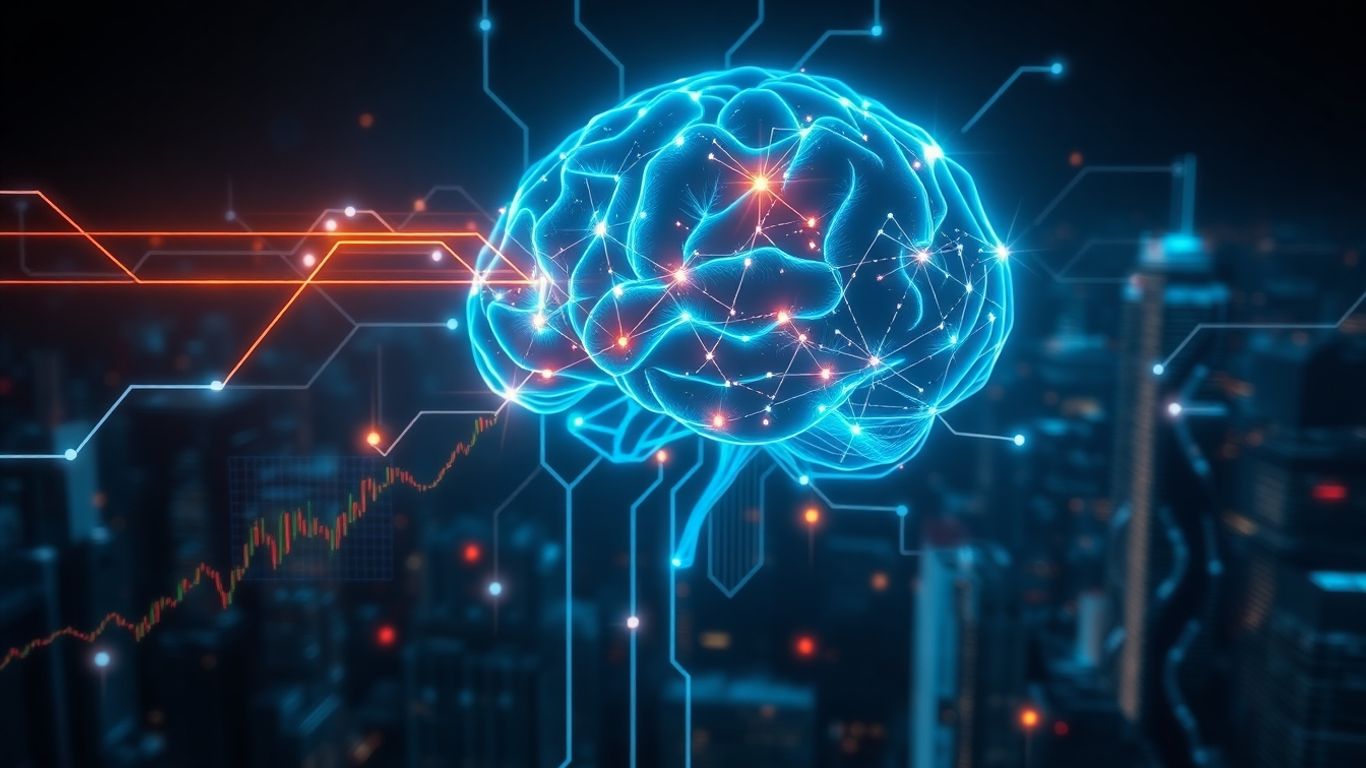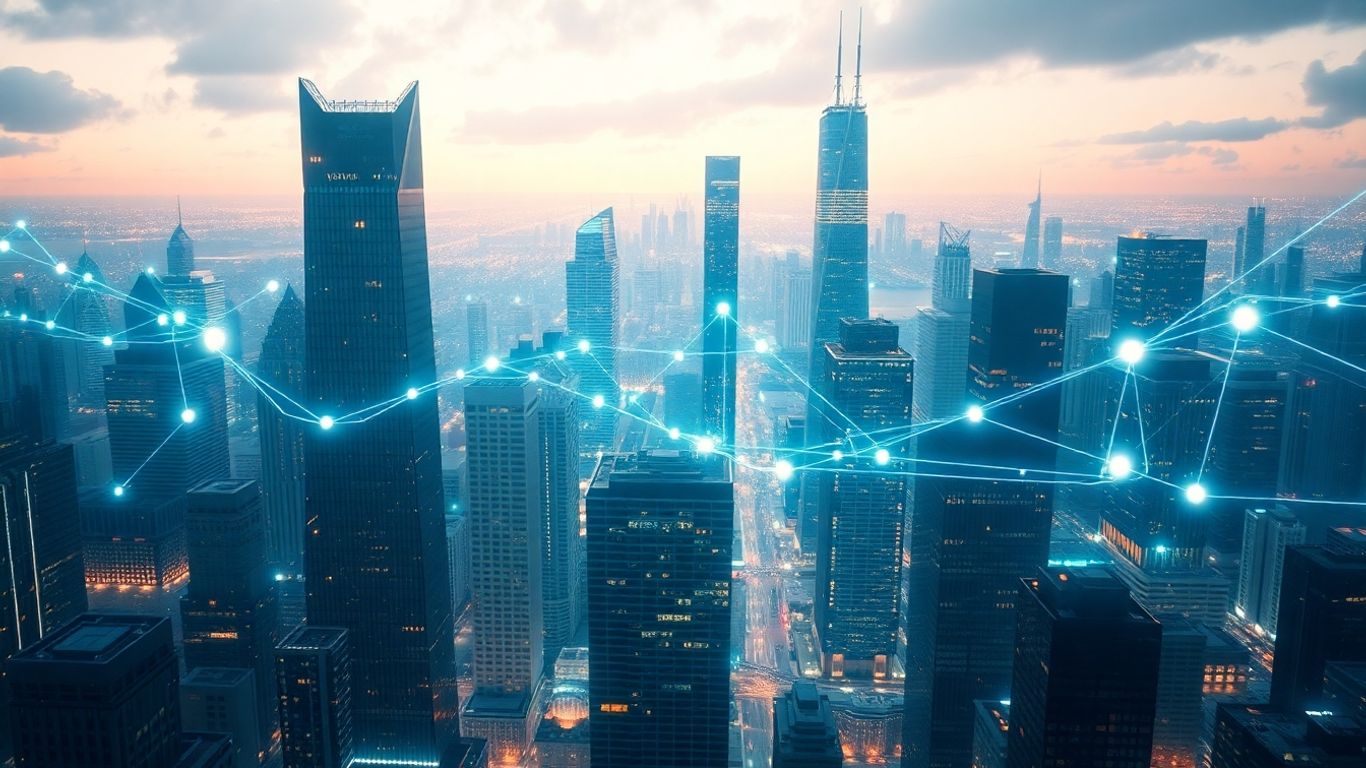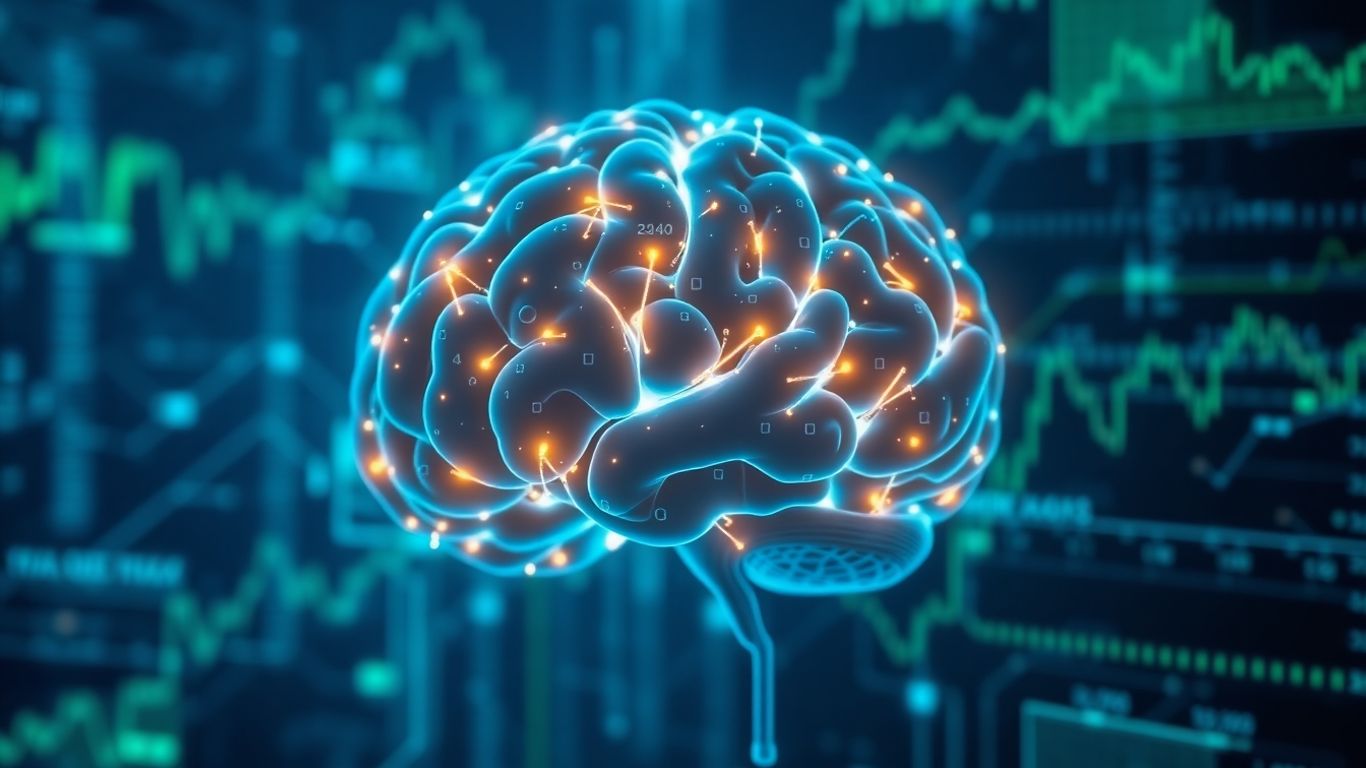You know, the world of finance is always changing, and lately, it feels like AI is everywhere. Especially when it comes to real-world assets, or RWAs, and how we manage the risks involved. It’s like AI is giving us a whole new set of tools to look at things, making the process of handling these assets a lot more straightforward. We're talking about things like checking values in real-time and spotting problems before they get big. It's pretty interesting stuff, and it’s definitely changing how things are done.
Key Takeaways
- AI helps in checking the value of real-world assets instantly and can even predict future trends, making the AI-powered risk assessment for RWAs more effective.
- Automating checks for things like due diligence and making sure everything follows the rules is now much easier with AI.
- AI is a big help in finding fraud or unusual activity that might otherwise be missed, which is a big part of managing risk.
- The process of turning real-world assets into digital tokens is getting smoother thanks to AI handling tasks like verification and contract work.
- AI is also making it simpler to manage investment portfolios and keep an eye on market changes all the time.
Enhancing Risk Management Through AI-Powered Risk Assessment for RWAs

When we talk about tokenizing real-world assets (RWAs), like that old painting in your attic or a piece of commercial real estate, a big question always comes up: how do we actually manage the risks involved? It's not like trading stocks where everything's already pretty digital. This is where artificial intelligence is really starting to make a difference, especially in how we assess those risks.
Real-Time Valuation and Predictive Analytics
Figuring out what an asset is worth, especially something unique, can be a slow process. Traditionally, you'd need appraisers, market reports, and a lot of waiting. AI changes that. It can look at tons of data – past sales, current market trends, economic news, even things like local development plans for real estate – and give you a valuation pretty much on the spot. This speed is a game-changer for making quick, informed decisions. Beyond just knowing the current value, AI can also predict potential future values or identify assets that might be heading for trouble. It's like having a crystal ball, but it's powered by data, not magic.
Automated Due Diligence and Compliance Checks
Before you can tokenize an asset, you have to do your homework. This means checking ownership, verifying legal status, and making sure everything is above board. AI can automate a lot of this tedious work. It can sift through legal documents, cross-reference databases, and flag any potential issues that might stop a tokenization deal from happening. This not only saves a huge amount of time and money but also helps make sure that the tokens being issued are backed by legitimate assets, reducing the chance of problems down the line.
Fraud Detection and Anomaly Identification
In any financial market, fraud is a concern. With tokenized assets, especially when they're new and still being understood, the risk can be higher. AI is pretty good at spotting things that don't look right. It can monitor transactions and asset data for unusual patterns that might indicate someone is trying to pull a fast one, like trying to tokenize an asset that's already been claimed or is part of a fraudulent scheme. By flagging these anomalies early, AI helps protect both the platform and the investors involved.
The ability of AI to process vast amounts of information and identify subtle patterns is key to building trust in the tokenization of real-world assets. It moves us closer to a system where asset values are clear and risks are well-understood before any investment is made.
Here's a quick look at how AI helps assess risk:
- Valuation Accuracy: AI analyzes more data points than humans can, leading to more precise asset pricing.
- Trend Identification: Predictive models can forecast market shifts, helping to anticipate potential downturns.
- Compliance Monitoring: Automated checks ensure adherence to regulations, minimizing legal exposure.
- Pattern Recognition: AI spots unusual activity that could signal fraud or operational errors.
Streamlining Tokenization Processes with AI

You know, turning real-world stuff like buildings or art into digital tokens sounds pretty cool, but the actual process can be a real headache. It involves a lot of checking, verifying, and making sure everything is by the book. That's where AI is stepping in, and honestly, it's making things a whole lot less painful.
Automating Asset Verification and Valuation
Before you can even think about tokenizing something, you need to know exactly what it's worth and that it's legit. AI can crunch a ton of data – think market trends, historical sales, even economic reports – to figure out a fair price. It's way faster than a human team doing the same thing, and it cuts down on mistakes. Plus, it can help verify ownership and other important details automatically.
- Automated data analysis for pricing.
- Digital verification of ownership documents.
- Cross-referencing asset details with public records.
Optimizing Smart Contract Development and Execution
Smart contracts are the digital agreements that run tokenized assets. They need to be perfect, or things can go wrong fast. AI can actually look through the code for bugs or security holes before they become a problem. It can also help translate complex legal terms into code that the computer understands, making sure the contract does exactly what it's supposed to.
AI acts like a super-powered proofreader for the code that makes tokenized assets work, catching errors and making sure the rules are followed.
Reducing Operational Costs and Time-to-Market
All this automation means less manual work. Less manual work means fewer people needed for repetitive tasks, which saves money. It also means things can get done much quicker. Instead of months, maybe it takes weeks to get a new tokenized asset ready to go. This speed and cost saving is a big deal for anyone trying to bring new investment opportunities to people.
- Reduced labor costs for manual checks.
- Faster turnaround for asset issuance.
- Lower overall expenses in the tokenization pipeline.
AI's Role in Portfolio Optimization and Monitoring
Managing a collection of tokenized real-world assets can get complicated, especially when you've got a lot of different things in there. AI is stepping in to automate a bunch of the tasks involved, like keeping tabs on how everything's doing, adjusting the mix of assets, and spotting potential problems before they become big issues. It's not just about saving time and money; it's about making your investments work better overall.
Dynamic Portfolio Rebalancing
Markets don't stand still, and neither should your investments. AI can watch market signals and asset performance in real-time. When conditions change, it can suggest or even automatically make adjustments to your portfolio to keep it aligned with your goals. This means selling assets that might be losing value and buying ones that look promising, all based on data, not just a hunch.
Here's a look at how AI helps rebalance:
- Performance Tracking: Continuously monitors the value and risk of each asset.
- Goal Alignment: Checks if the current asset mix still matches your investment objectives.
- Automated Adjustments: Executes trades to rebalance the portfolio when predefined thresholds are met.
- Risk Mitigation: Reduces exposure to assets showing negative trends or increased volatility.
AI's ability to process vast amounts of market data allows for quicker and more informed decisions about portfolio adjustments than manual methods. This proactive approach can help smooth out the ups and downs of investing.
On-Chain Settlement and Smart Escrow Services
When you're dealing with tokenized assets, settling transactions and holding them securely is key. AI can help make these processes smoother and more trustworthy. Think about smart contracts acting as automated escrow agents, releasing assets only when specific conditions are met, like a payment being confirmed on the blockchain. AI can monitor these conditions and ensure everything happens as it should, reducing the need for intermediaries and speeding things up.
Real-Time Market Condition Analysis
Understanding what's happening in the market right now is super important for making good investment choices. AI can sift through news, social media chatter, and trading data to get a sense of market sentiment and identify emerging trends. This real-time analysis helps investors react faster to changing conditions and make more educated decisions about their tokenized assets. It's like having a constant market pulse check, giving you an edge in fast-moving markets.
Addressing Challenges in AI-Driven RWA Markets
So, while AI is doing some pretty amazing things for real-world asset tokenization, it's not all smooth sailing. There are definitely some hurdles we need to jump over before this whole thing becomes as common as, well, buying coffee.
Navigating Regulatory Uncertainty and Compliance
This is a big one. Laws and rules are always changing, and they're different everywhere you look. Trying to keep AI systems up-to-date with all these shifting regulations is a constant headache. It means a lot of manual checking and tweaking, which kind of defeats the purpose of automation, doesn't it?
- Global Patchwork: Different countries have wildly different rules about tokenized assets and AI. What's okay in one place might be a no-go in another.
- Evolving Laws: Regulators are still figuring out how to handle this new tech. What's legal today might not be tomorrow.
- Compliance Costs: Keeping up with all these rules can get expensive, especially for smaller players.
The speed at which AI can process information is incredible, but it needs clear, consistent guidelines to operate within. Without them, there's a real risk of missteps that could have serious financial consequences.
Mitigating Security Risks and Exploitation
We're talking about digital money and assets here, so security is obviously super important. AI systems themselves can be targets. Bad actors could try to mess with the AI to steal assets or disrupt the whole system. It’s like leaving your digital vault door wide open if the AI guarding it isn't rock solid.
- AI Vulnerabilities: AI models can be tricked or manipulated, leading to incorrect decisions or outright theft.
- Smart Contract Flaws: Even with AI, the underlying smart contracts can have bugs that hackers can exploit.
- Data Breaches: The vast amounts of data AI uses need to be protected from unauthorized access.
Ensuring Data Integrity and Trustworthiness
AI is only as good as the data it's fed. If the data is bad – incomplete, biased, or just plain wrong – the AI's output will be too. This is a problem because people need to trust the valuations and predictions the AI makes. If investors can't rely on the numbers, they won't invest.
- Garbage In, Garbage Out: Poor quality data leads to unreliable asset valuations and risk assessments.
- Algorithmic Bias: AI can unintentionally perpetuate existing biases present in the data, leading to unfair outcomes.
- Transparency Issues: Sometimes, it's hard to understand exactly why an AI made a certain decision, which makes it difficult to verify its accuracy.
The Future of AI in Real-World Asset Tokenization
So, what's next for turning real stuff into digital tokens, especially with AI in the mix? It feels like we're just scratching the surface, honestly. AI is really starting to make this whole tokenization thing way more accessible and, frankly, a lot smarter. It's not just about making things faster; it's about making them work better for everyone involved.
Democratizing Investment Opportunities
One of the biggest things AI is doing is opening doors for more people to invest. Think about owning a tiny piece of a big apartment building or a piece of art that used to be out of reach. AI helps break down these big, expensive assets into smaller, affordable chunks. This means your average person, not just the super-rich, can get a piece of the pie. It's about making investment opportunities available to a much wider group of people, which is pretty neat.
- Fractional Ownership: AI makes it easier to divide high-value assets into many small parts.
- Global Access: People from anywhere can invest in assets they couldn't before.
- Lower Entry Barriers: You don't need a fortune to start investing in certain assets.
Bridging Traditional and Decentralized Finance
AI is acting like a translator between the old way of doing finance and the new, blockchain-based world. It helps make sure that when a real-world asset is turned into a digital token, it still makes sense in the traditional financial system. This means things like loans, insurance, and even legal frameworks can start to work with these new digital assets. It's helping to connect these two worlds, making it smoother for businesses and investors to move between them.
AI's ability to process vast amounts of data and adapt to changing conditions is key to building trust between traditional financial systems and the newer, decentralized markets. This connection is vital for widespread adoption.
Transformative Leap in Asset Ownership
Ultimately, AI is changing how we think about owning things. It's making ownership more flexible, more transparent, and easier to manage. Imagine being able to trade a piece of a commercial property as easily as you trade stocks, with clear ownership records and quick transactions. AI is making this a reality, speeding up processes and cutting out a lot of the old paperwork and middlemen. This shift promises a future where owning and trading assets is more efficient and inclusive than ever before.
Wrapping It Up
So, as we've seen, AI isn't just a buzzword anymore when it comes to managing risks in RWA markets. It's actively changing how things are done, making processes faster and, frankly, a lot smarter. From spotting potential problems before they even happen to making sure everything stays on the right side of the rules, AI is becoming a pretty important tool. While there are still some hurdles to clear, like making sure the data is good and that regulations keep up, the direction is clear. AI is helping to make these markets more open, more secure, and just generally better for everyone involved. It's a big shift, and it's only going to grow from here.
Frequently Asked Questions
What exactly are Real-World Assets (RWAs) in the world of tokenization?
Think of Real-World Assets, or RWAs, as anything valuable that isn't already a digital thing on a computer. This includes stuff like buildings, art, gold, or even company stocks. Tokenizing them means turning ownership of these real things into digital tokens on a blockchain, making them easier to buy, sell, and manage.
How does AI help make valuing RWAs better?
AI is like a super-smart assistant for valuing RWAs. It can look at tons of information really fast – like past sales, market trends, and economic news – to figure out a fair price. This is way quicker and often more accurate than a person doing it alone, helping everyone make better decisions.
Can AI really help prevent fraud in tokenized markets?
Yes, AI is great at spotting unusual activity that might be a scam. It can watch all the transactions happening and flag anything that looks suspicious, like weird money movements or fake identities. This helps protect investors from losing their money to bad actors.
What does AI do to make buying and selling tokenized assets smoother?
AI helps speed up many steps. It can automatically check if people are who they say they are (like KYC checks) and make sure everything follows the rules. It also helps make sure the digital contracts (smart contracts) that manage these assets work correctly and securely, reducing delays and mistakes.
Is it safe to trust AI with managing my investments in tokenized assets?
AI helps manage investments by looking at market changes and suggesting when to buy or sell to get the best results or avoid big losses. While AI can make smart suggestions based on data, it's still important for investors to understand the risks and make their own final decisions. It's a tool to help, not a replacement for human judgment.
What are the biggest hurdles for AI in the RWA tokenization world?
There are a few big challenges. First, rules and laws about this are still being figured out, and they change a lot. Second, keeping the AI systems and the digital tokens super secure from hackers is crucial. Lastly, making sure the information AI uses is correct and trustworthy is key to keeping people's confidence.




